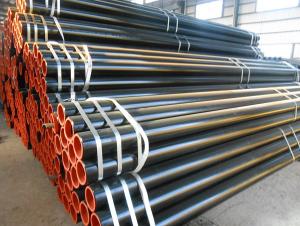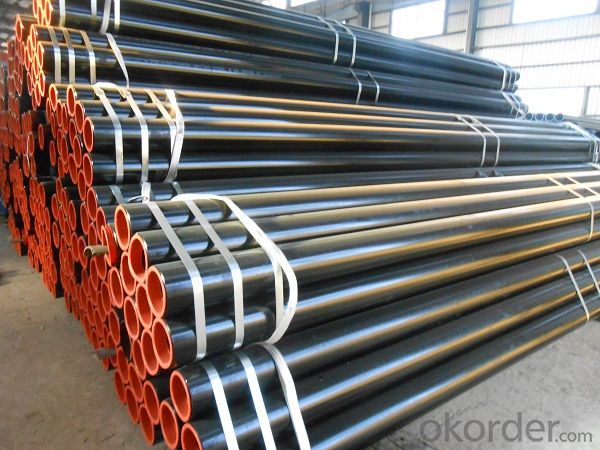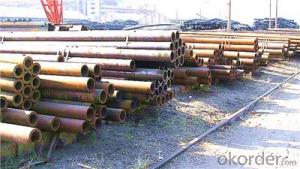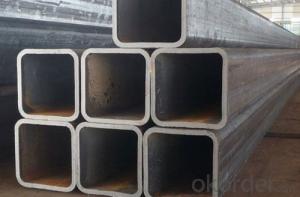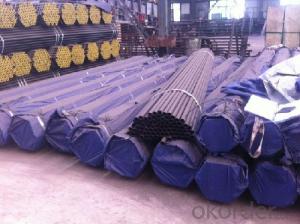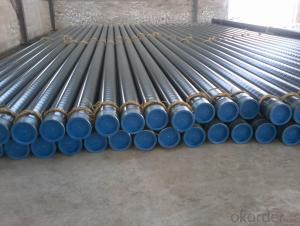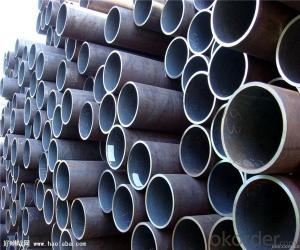Seamless pipe of various materials reasonable price
- Loading Port:
- Tianjin
- Payment Terms:
- TT or LC
- Min Order Qty:
- 50 m.t.
- Supply Capability:
- 17000 m.t./month
OKorder Service Pledge
OKorder Financial Service
You Might Also Like
1、Structure of Seamless pipe of various materials reasonable price
Seamless pipe is formed by drawing a solid billet over a piercing rod to create the hollow shell. As the manufacturing process does not include any welding, seamless pipes are perceived to be stronger and more reliable. Historically seamless pipe was regarded as withstanding pressure better than other types, and was often more easily available than welded pipe. Seamless steel pipe has a hollow section, a large number of pipes used for conveying fluid, such as oil, natural gas, gas, water and some solid materials, etc
2、Main Features of Seamless pipe of various materials reasonable price
• Good visual effect
• Reasonable price
3、 Seamless pipe of various materials Specification:
Standard | GB, DIN, ASTM ASTM A106-2006, ASTM A53-2007 |
Grade | 10#-45#, 16Mn 10#, 20#, 45#, 16Mn |
Thickness | 8 - 33 mm |
Section Shape | Round |
Outer Diameter | 133 - 219 mm |
Place of Origin | Shandong, China (Mainland) |
Secondary Or Not | Non-secondary |
Application | Hydraulic Pipe |
Technique | Cold Drawn |
Certification | API |
Surface Treatment | factory state or painted black |
Special Pipe | API Pipe |
Alloy Or Not | Non-alloy |
Length | 5-12M |
Outer Diameter | 21.3-610mm |
Grade | 20#, 45#, Q345, API J55, API K55, API L80, API N80, API P110, A53B |
Standard | ASME, ASTM |
1) Material:20#(ASTM A 106/A53 GRB.API5LGRB,GB),45#,16Mn,10#.
2) Specification range:OD:21.3-610mm,WT:6-70mm,length:6-12m or according to the requirement of clients.
3) Excutive standards:GB,ASME API5L.ASTM A 106/A53,Despite of the above standards,we can also supply seamless steel pipe with standard of DIN,JIS,and so on,and also develop new products according to the requirements of our clients!
4) Surface:black lacquered,varnish coating or galvanized.
5) Ends:Beveled or square cut,plastic capped,painted.
6) Packing:bundles wrapped with strong steel strip,seaworthy packing.
4、Packaging & Delivery
Packaging Details: | seaworthy package,bundles wrapped with strong steel strip |
Delivery Detail: | 15-30days after received 30%TT |
5、FAQ of Seamless pipe of various materials reasonable price
①How is the quality of your products?
Our products are manufactured strictly according to national and internaional standard, and we take a test
on every pipe before delivered out. If you want see our quality certifications and all kinds of testing report, please just ask us for it.
Guaranteed: If products’ quality don’t accord to discription as we give or the promise before you place order, we promise 100% refund.
②How about price?
Yes, we are factory and be able to give you lowest price below market one, and we have a policy that “ for saving time and absolutely honest business attitude, we quote as lowest as possible for any customer, and discount can be given according to quantity”,if you like bargain and factory price is not low enough as you think, just don’t waste your time.Please trust the quotation we would give you, it is professional one.
6、 Seamless pipe of various materials reasonable price Images:
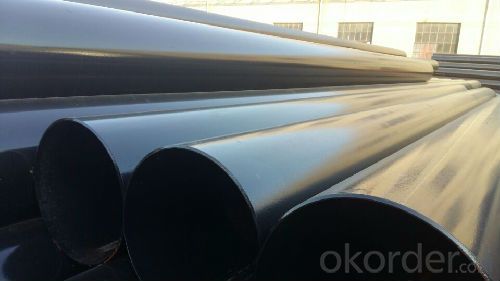
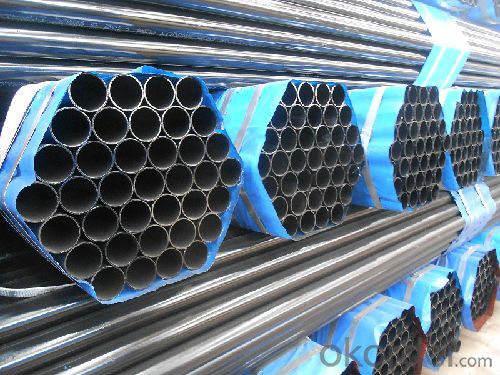
- Q: What are the different methods of pipe cutting for steel pipes?
- There are several methods of pipe cutting for steel pipes, each suited for different situations and requirements. Some of the most common methods include: 1. Manual Pipe Cutters: These handheld tools are commonly used for cutting smaller diameter steel pipes. They typically feature a cutting wheel that is rotated around the pipe, gradually creating a groove until the pipe is cut through. Manual pipe cutters are portable and relatively easy to use, making them suitable for on-site cutting tasks. 2. Hacksaw: Using a hacksaw is a traditional and cost-effective method for cutting steel pipes. This method requires physical effort and time, but it can be effective for cutting pipes with smaller diameters. It is important to use a fine-toothed blade and apply steady pressure to ensure a clean and precise cut. 3. Reciprocating Saw: Also known as a sawzall, a reciprocating saw is a power tool that uses a back-and-forth cutting motion to quickly and efficiently cut through steel pipes. These saws are versatile and can be used with different types of blades to handle different pipe sizes and thicknesses. 4. Band Saw: Band saws are commonly used in industrial settings for cutting large steel pipes. These saws feature a continuous loop of teethed metal blade that runs on wheels, allowing for precise and rapid cutting. Band saws are ideal for cutting large-diameter pipes and can be manually operated or fully automated for high-volume cutting tasks. 5. Pipe Cutting Machines: To achieve accurate and consistent cuts, pipe cutting machines are often used. These machines are designed to cut steel pipes with speed and precision, making them ideal for large-scale industrial applications. Depending on the specific machine and requirements, different cutting methods such as abrasive cutting, flame cutting, or plasma cutting can be employed. It is important to note that the choice of pipe cutting method depends on factors such as pipe diameter, thickness, location, precision requirements, and available resources. Proper safety precautions should always be followed when working with any cutting method to avoid injury or damage to the pipes.
- Q: How are steel pipes insulated for thermal applications?
- Steel pipes are commonly insulated for thermal applications using various materials such as fiberglass, mineral wool, or foam insulation. These insulating materials are typically wrapped around the steel pipes to create a protective barrier that reduces heat transfer. Additionally, a vapor barrier may be installed to prevent moisture condensation. This insulation helps to maintain the desired temperature of the fluid or gas being transported through the pipes and prevents energy loss.
- Q: What is the difference between steel pipes and PPR pipes?
- Steel pipes are made of a durable and strong material, steel, which makes them suitable for carrying high-pressure fluids and gases. On the other hand, PPR (polypropylene random copolymer) pipes are made of a plastic material, which makes them lightweight, corrosion-resistant, and easy to install. PPR pipes are commonly used for plumbing systems, while steel pipes are more commonly used for industrial applications and heavy-duty purposes.
- Q: What are the properties of steel that make it suitable for pipe manufacturing?
- Steel is an ideal material for pipe manufacturing due to its various properties, including high strength, durability, and resistance to corrosion and extreme temperatures. It can withstand high pressure and can be easily fabricated into different shapes and sizes, making it versatile for various piping applications. Additionally, its smooth surface ensures efficient flow of fluids and reduces friction losses.
- Q: What are the different manufacturing standards for steel pipes?
- There are several manufacturing standards for steel pipes that are widely recognized and implemented in the industry. These standards ensure that the steel pipes are produced to meet specific requirements and quality standards. Some of the most common manufacturing standards for steel pipes include: 1. American Society for Testing and Materials (ASTM): ASTM standards are widely used in the United States and cover a wide range of steel pipe specifications. These standards include specifications for seamless and welded steel pipes, as well as various grades and dimensions. 2. International Organization for Standardization (ISO): ISO standards are globally recognized and provide guidelines for the production of steel pipes. ISO standards cover areas such as dimensions, materials, testing, and quality control. 3. European Norm (EN): EN standards are applicable in Europe and provide specifications for various types of steel pipes. These standards cover aspects such as dimensions, materials, manufacturing processes, and testing. 4. Japanese Industrial Standards (JIS): JIS standards are widely used in Japan and have gained international recognition. These standards cover dimensions, materials, and testing methods for steel pipes. 5. British Standards (BS): BS standards are commonly used in the United Kingdom and cover a range of steel pipe specifications. These standards include requirements for dimensions, materials, and testing procedures. 6. American Petroleum Institute (API): API standards are specifically developed for the oil and gas industry and cover various aspects of steel pipe manufacturing. These standards include specifications for seamless and welded pipes used in oil and gas exploration, production, and transportation. It is important for manufacturers, buyers, and users of steel pipes to be aware of these standards to ensure the quality, compatibility, and reliability of the pipes. Compliance with these standards helps to ensure that the steel pipes meet the necessary requirements and are suitable for their intended applications.
- Q: Are steel pipes suitable for wastewater pumping stations?
- Yes, steel pipes are suitable for wastewater pumping stations. Steel pipes have excellent strength and durability, making them capable of withstanding the corrosive nature of wastewater and the high pressure involved in pumping. Additionally, steel pipes are resistant to extreme temperatures and can handle the heavy loads commonly associated with wastewater systems.
- Q: How do you calculate the pipe buoyancy for steel pipes in water?
- In order to determine the buoyancy of steel pipes in water, one must take into account the weight of the water displaced by the submerged part of the pipe. This can be achieved by applying Archimedes' principle, which states that the buoyant force on an object submerged in a fluid is equal to the weight of the fluid displaced by the object. Firstly, the volume of the submerged portion of the pipe needs to be calculated. This can be accomplished by multiplying the cross-sectional area of the pipe by the length of the submerged part. Next, the density of the water surrounding the pipe must be determined. Typically, this value is approximately 1000 kg/m³ for freshwater and slightly higher for seawater. To find the weight of the water displaced, multiply the volume of the submerged portion of the pipe by the density of the water. Lastly, compare the weight of the water displaced to the weight of the steel pipe. If the weight of the water displaced is greater than that of the pipe, the pipe will exhibit buoyancy and tend to float. Conversely, if the weight of the pipe is greater, it will sink. It is worth noting that factors such as pipe design, wall thickness, and external forces acting upon the pipe may also impact its buoyancy. Therefore, it is advisable to consult industry-specific guidelines or seek professional advice for precise calculations in specific scenarios.
- Q: What are the advantages of using steel pipes in the manufacturing industry?
- There are several advantages of using steel pipes in the manufacturing industry. Firstly, steel pipes are known for their high strength and durability, making them ideal for carrying heavy loads and withstanding harsh conditions. Secondly, steel pipes have excellent resistance to corrosion, reducing the risk of leaks and ensuring a longer lifespan. Additionally, steel pipes offer a wide range of sizes and shapes, allowing for flexibility in design and easy customization. Furthermore, steel pipes are cost-effective compared to other materials, as they require minimal maintenance and have a low risk of failure. Lastly, steel pipes are environmentally friendly, as they are fully recyclable and contribute to reducing carbon emissions during manufacturing. Overall, the advantages of using steel pipes in the manufacturing industry make them a reliable and efficient choice for various applications.
- Q: Are steel pipes suitable for underground nuclear waste storage?
- Underground nuclear waste storage does not lend itself to the use of steel pipes due to their unsuitability. Despite their strength and durability, steel pipes are susceptible to corrosion when in contact with certain forms of nuclear waste. As time passes, the radioactive elements can corrode the steel pipes, potentially leading to leaks and the contamination of the surrounding environment. Furthermore, steel pipes lack the necessary design to endure the extreme temperatures and pressures commonly found in nuclear waste storage facilities. Consequently, alternative materials like corrosion-resistant alloys or concrete are generally employed for underground nuclear waste storage to guarantee the confinement and isolation of hazardous substances.
- Q: How do you calculate the weight of a steel pipe?
- In order to determine the weight of a steel pipe, one must possess knowledge of the pipe's dimensions, specifically the outer diameter (OD), wall thickness, and length. Initially, one must ascertain the cross-sectional area of the pipe. This can be accomplished by subtracting the inner diameter (ID) from the outer diameter (OD) and dividing the outcome by 2 to acquire the radius. Subsequently, the formula A = πr^2 can be employed to compute the area. Following this, it is necessary to multiply the cross-sectional area by the length of the pipe to obtain the volume. The formula for volume is V = A * L, where A denotes the cross-sectional area and L signifies the length. Lastly, to determine the weight of the steel pipe, one must multiply the volume by the density of steel. The density of steel generally falls around 7850 kilograms per cubic meter (kg/m^3) or 0.2836 pounds per cubic inch (lb/in^3). The formula for weight is W = V * ρ, where V represents the volume and ρ denotes the density of steel. It is crucial to note that if one is employing different units, a conversion is imperative to match the units of the density. For instance, if the length is in feet and the density is in pounds per cubic inch, the length must be converted to inches prior to conducting the calculations. Always remember to thoroughly verify your measurements and calculations to ensure precision.
Send your message to us
Seamless pipe of various materials reasonable price
- Loading Port:
- Tianjin
- Payment Terms:
- TT or LC
- Min Order Qty:
- 50 m.t.
- Supply Capability:
- 17000 m.t./month
OKorder Service Pledge
OKorder Financial Service
Similar products
Hot products
Hot Searches
Related keywords
